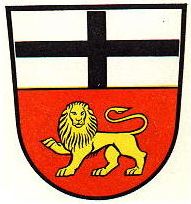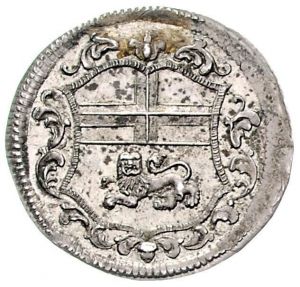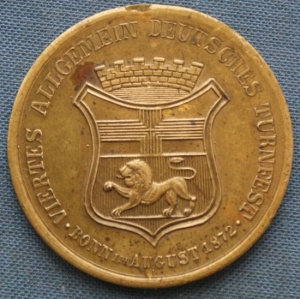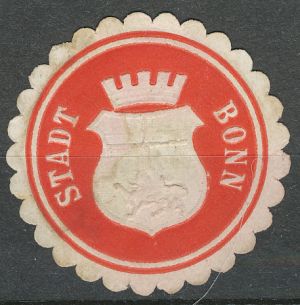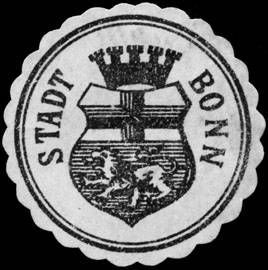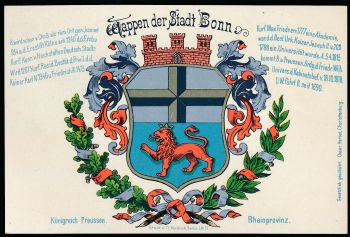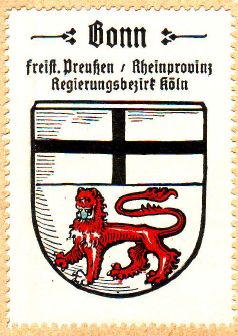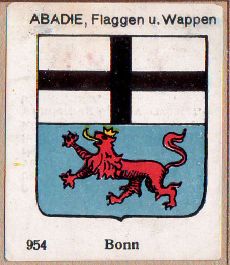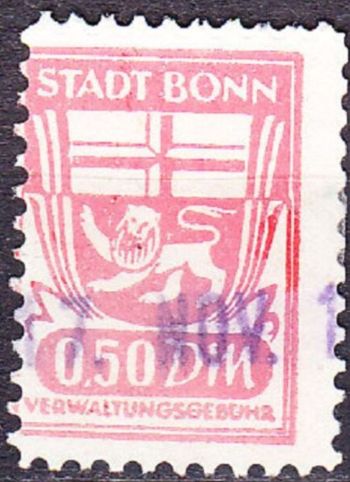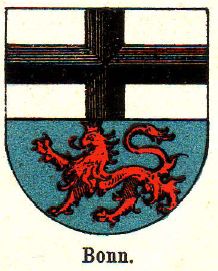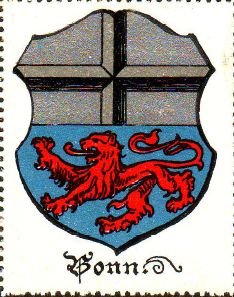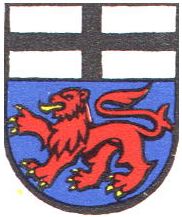Bonn: Difference between revisions
Knorrepoes (talk | contribs) m (Text replacement - "|center|Wappen von {{PAGENAME}}]] " to "|center|alt=Wappen von {{PAGENAME}} / Arms of {{PAGENAME}}]] ") |
Knorrepoes (talk | contribs) m (Text replacement - " / Arms" to "/Arms") |
||
| Line 6: | Line 6: | ||
Additions : 1904 Dottendorf, Endenich, Kessenich, Poppelsdorf; 1969 : [[Amt Duisdorf]], [[Beuel]], [[Bad Godesberg]], Buschdorf, Duisdorf, Ippendorf, [[Lengsdorf]], Lessenich, Röttgen, Holzlar, [[Oberkassel]] | Additions : 1904 Dottendorf, Endenich, Kessenich, Poppelsdorf; 1969 : [[Amt Duisdorf]], [[Beuel]], [[Bad Godesberg]], Buschdorf, Duisdorf, Ippendorf, [[Lengsdorf]], Lessenich, Röttgen, Holzlar, [[Oberkassel]] | ||
[[File:bonn.jpg|center|alt=Wappen von {{PAGENAME}} / Arms of {{PAGENAME}}]] | [[File:bonn.jpg|center|alt=Wappen von {{PAGENAME}}/Arms of {{PAGENAME}}]] | ||
{| class="wikitable" | {| class="wikitable" | ||
Revision as of 08:43, 2 September 2022
This page is part of the German heraldry portal Deutsche Wappensammlung |
Heraldry of the World |
|
German heraldry:
|
Selected collector's items from Germany:
|
BONN
State : Nordrhein-Westfalen
Urban District (Kreisfreie Stadt) : Bonn
Additions : 1904 Dottendorf, Endenich, Kessenich, Poppelsdorf; 1969 : Amt Duisdorf, Beuel, Bad Godesberg, Buschdorf, Duisdorf, Ippendorf, Lengsdorf, Lessenich, Röttgen, Holzlar, Oberkassel
| German |
|
| English | No blazon/translation known. Please click here to send your (heraldic !) blazon or translation |
Origin/meaning
The arms were officially granted on March 4 1971.
Bonn received city rights probably in the early 13th century. The oldest seal, known since 1250, shows the patron saint, St. Cassius, depicted as a knight. The next seal, dating from the 14th century, shows the cross of Köln and the lion. The area was part of the diocese of Köln. The lion is a symbol for the old 'Dingstuhl' or justice-place. The lion is often named 'Wölfchen' (little wolf) or 'Leopard' and is sometimes shown standing on a boar. On the ante-seals of the city only the lion is shown.
During the years the colours of the lower half of the arms have changed often. The most widely used colours were a red lion on a blue shiled, generally used from 1792-1971. But Hupp showed in the 1930s the arms with a silver field. Similarly, as can be seen from the images below, the lion has been crowned and with or without golden nails.
| The arms on a coin from 1699 |
The arms on a medal from 1871 |
| Seal from around 1900 |
Seal from around 1900 |
| The arms on a postcard, 1900-1905 |
The arms by Hupp in the Kaffee Hag albums +/- 1925 |
| The arms in the Abadie albums |
Municipal tax stamp, 1950s. |
| |
The arms used prior to 1971 (images from 1898, 1900 and 1960s) |
|
Contact and Support
Partners:
Your logo here ?
Contact us
© since 1995, Heraldry of the World, Ralf Hartemink 
Index of the site
Literature : Stadler, K. : Deutsche Wappen - Bundesrepublik Deutschland; Nagel, Rheinisches Wappenbuch


